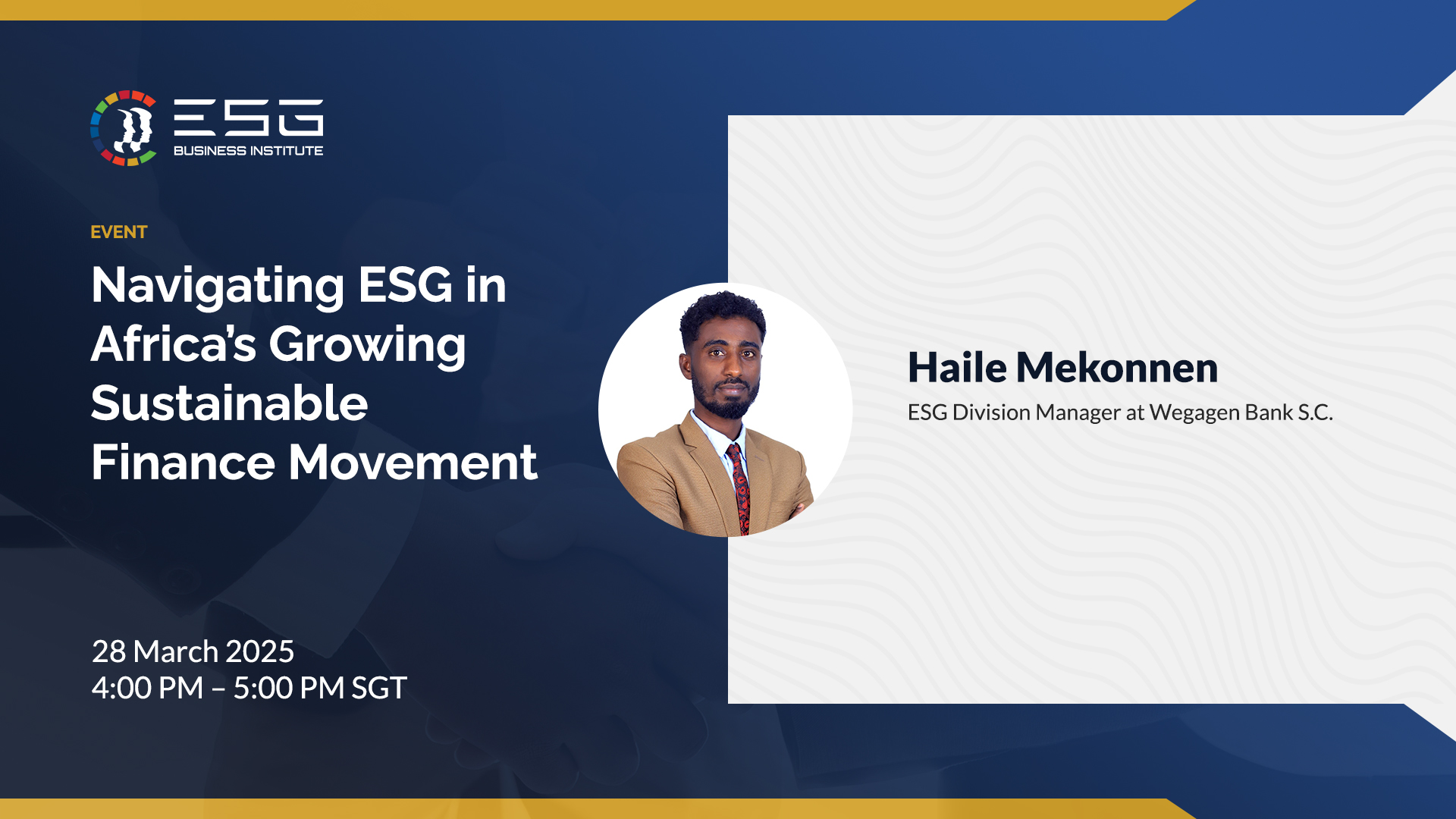For decades, the global investment community has hesitated to fully embrace Africa, citing political instability, weak regulatory systems, and outdated assumptions about risk. But a new conversation is emerging—one that reframes Africa not as a risk, but as a remarkable opportunity for impact investing and ESG-driven growth.
At the forefront of this shift is the ESG Business Institute (ESG BI), a global network dedicated to equipping leaders with the tools, knowledge, and community to advance Environmental, Social, and Governance (ESG) standards. In a recent webinar, seasoned ESG professional Haile Mekonnen and sustainability expert Tan Ee Beng led a compelling discussion dismantling long-held stereotypes and showcasing Africa’s readiness for sustainable investment.
The Old Narrative: “Too Risky to Invest”
Despite Africa holding less than 4% of global greenhouse gas emissions, the continent is disproportionately affected by climate change. Yet, in 2022, less than 2% of the world’s $1.2 trillion impact investment capital went to Africa.
Why? According to Haile, it often boils down to outdated narratives.
“Many investors still assume Africa is too unstable or too risky to invest in. But that’s only part of the story—and often an unfair one,” he said.
The reality on the ground is shifting. Ethiopia, for instance, has begun opening its banking sector to international players and recently launched its own securities exchange. These moves signal a readiness for serious, sustainable capital—and an eagerness to leave behind perceptions of economic fragility.
The Real Landscape: Green Shoots of ESG Progress
Haile shared how Ethiopia, while new to ESG, is already taking bold steps. In partnership with the IFC, the Ethiopian Bankers Association has released national sustainability guidelines. The National Bank of Ethiopia now requires all banks to issue sustainability reports within two years. Out of 32 banks in the country, three already have dedicated ESG units—and more are following suit.
Moreover, the newly launched Ethiopian Securities Exchange includes sustainability as a core requirement for listed companies. The pieces are falling into place.
What’s Really Holding Investment Back?
Yes, challenges exist—civil unrest in certain regions, limited regulatory enforcement, and the lack of mature capital markets. But Haile emphasized that perception often lags behind progress.
Investors also need:
-
Regulatory clarity and consistency
-
Exit mechanisms through capital markets
-
Transparent, data-driven ESG disclosures
-
Local partners with proven governance
These aren't insurmountable barriers—they’re common growing pains in emerging markets, and Africa is already addressing them.
Africa’s ESG Opportunity: A Goldmine for Impact Investors
Africa is rich in solar, wind, and hydro resources. It has a young, dynamic population. Its dependence on agriculture offers prime opportunities for climate-smart farming, financial inclusion, and affordable housing. Haile pointed to sectors like renewable energy, agri-tech, and sustainable manufacturing as especially ripe for impact investment.
But the key to unlocking this potential lies in trust and collaboration.
“We need investors who are willing to look beyond the stereotypes,” Haile said. “Do the research, visit the ground, talk to communities. The opportunity is enormous—and real.”
The Path Forward: Confidence, Not Caution
To shift the paradigm, Haile stressed the importance of “boardroom buy-in” from both African businesses and international investors. Governments must enforce ESG standards. Banks must integrate sustainability into daily operations. And investors must replace fear with fact-based confidence.
Blended finance, transparent ESG frameworks, and international certification systems can all help bridge the gap. But the real transformation begins when we start seeing Africa not as a risk, but as a resilient and resource-rich continent with the potential to lead in ESG innovation.
Final Word: Invest in Reality, Not Reputation
Africa is not a charity case—it’s a frontier of opportunity. The ESG Business Institute and leaders like Haile Mekonnen are proving that the tools, ambition, and networks are already in place. What’s needed now is a change in mindset.
“Impact investment should not be a solo mission,” Haile concluded. “We must work together—governments, private sector, financial institutions, and global partners—to build a sustainable future.”
Be Part of the Change
Break the stereotype. Join the ESG Business Institute and become part of a global movement reshaping the future of sustainable investing—where Africa isn’t the exception, but the expectation.

